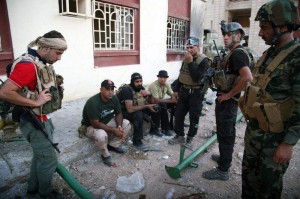
U.S. war planners focus on advisers in Anbar
Top U.S. military planners want to expand the limited advise-and-assist mission in Iraq and are talking to allied partner nations about potentially putting non-American troops on the ground to help support the fight against Islamic State group militants, according to several military officials.
The high-level discussion of expanding the support mission comes as the Iraqi army struggles to stop the advance of the militants, who are mounting large-scale attacks in northern and western Iraq. The result could be to push foreign military advisers to Iraqi units closer to the ground-level war-fighting operations, most likely in Anbar province.
Several U.S. Central Command officials familiar with the Iraq mission who spoke to reporters on condition of anonymity said U.S. forces are advising the Iraqi army at the division and headquarters levels.
“We are in a number of planning iterations of, ‘What does that look like to go to a lower level to more responsibly be able to advise at division and brigade levels? What are the implications … in terms of the numbers?” a CENTCOM official said.
About 1,400 U.S. troops are in Iraq, including 600 assigned to support Iraqi security forces in joint operations centers in Baghdad and Irbil and also in 12 teams of special operations troops working alongside high-level Iraqi military leaders. The remaining 800 U.S. service members are assigned to security posts around the U.S. Embassy, other American facilities and the Baghdad airport.
For now, no U.S. military advisers are in Anbar province, where Islamic State forces are gaining ground in the Euphrates River valley between the town of al-Qaim on the Syrian border through Fallujah and the neighborhoods on the western outskirts of Baghdad.
More support in Anbar
Getting more support to those Iraqi units in Anbar is an emerging priority.
“When are we going to put advisers in Anbar? I can’t tell you when. But I can tell you there is whole lot of discussion and planning going on as to how we can help the Iraqis move forward with their plan,” a CENTCOM official said. “Our coalition partners are interested in doing this. There is a lot of discussion among them about where the advisers should be placed.”
U.S. officials declined to say which coalition partners are talking about deploying military advisers to Iraq. While other militaries from Europe and the Middle East have participated in the American-led airstrikes on Islamic State targets in Iraq and Syria, the ground-level mission in Iraq today involves only U.S. and Iraqi troops.
Recent gains by the jihadists, particularly in Anbar, are forcing U.S. planners to acknowledge that the Iraqis need more support to roll back the militants.
“I would not say that the Iraqi army is broadly on the counteroffensive right now,” a CENTCOM official said.
“We need to help the Iraqi army take the counteroffensive, and that is going to require a more sustained effort,” he said.
“To do that, we think there are some longer-term train-and-equip efforts that we have to undertake in Iraq along with our coalition partners. That goes beyond just advising and assisting. It goes to the issue of institutional training and institutional reform.”
Such long-term efforts likely take many months, the official said, adding: “This is not a U.S. timetable; it’s an Iraqi timetable.”
No boots on the ground
U.S. military officials remain insistent that no consideration is being given to putting U.S. troops on the ground in a combat role in Iraq. And those officials also emphasize that ultimately ending the Islamic State group’s reign across Iraq’s Sunni regions will require big political changes that can reconcile warring Sunni and Shiite factions.
U.S. and Iraqi officials hope to replicate the same strategy used in 2007-08 in Anbar that drained support from the extremists by courting local Sunni tribal leaders.
But progress remains limited because many tribal leaders want to see whether Iraq’s new Shiite-led government and Prime Minister Haider al-Abadi follow through on promises to share power and oil revenue with the Sunnis.
“In many ways, they are waiting to see where [Iraq Prime Minister Haider] Abadi’s government is going,” a CENTCOM official said.
“The Sunni tribal leaders are part of our strategy, clearly,” an official said. “But part of what we have to do is make sure we don’t squander our own credibility with respect to where the Iraqi government under Abadi is going to go. … I don’t think we’re in a position to make any promises on behalf of the [Iraqi] government.
“At the end of the day, we can push only so far,” the official said.
The Islamic State is a unique and unfamiliar enemy in part because it blends the characteristics of a traditional nation-state and a terrorist group. Militants are seizing territory and amassing conventional forces but also sometimes display traits of an insurgency by blending into the population and intimidating residents with high-profile attacks.
U.S. planners are optimistic that the the tide can be turned against the militants. But how the group might respond remains a mystery.
“Will they turn into Nazi Germany hunkering down in Berlin?” a CENTCOM official said. “Will they turn into [al-Qaida in Iraq] and distribute in the population?
“How do they evolve when they start to die?”
SOURCE: Army Times




